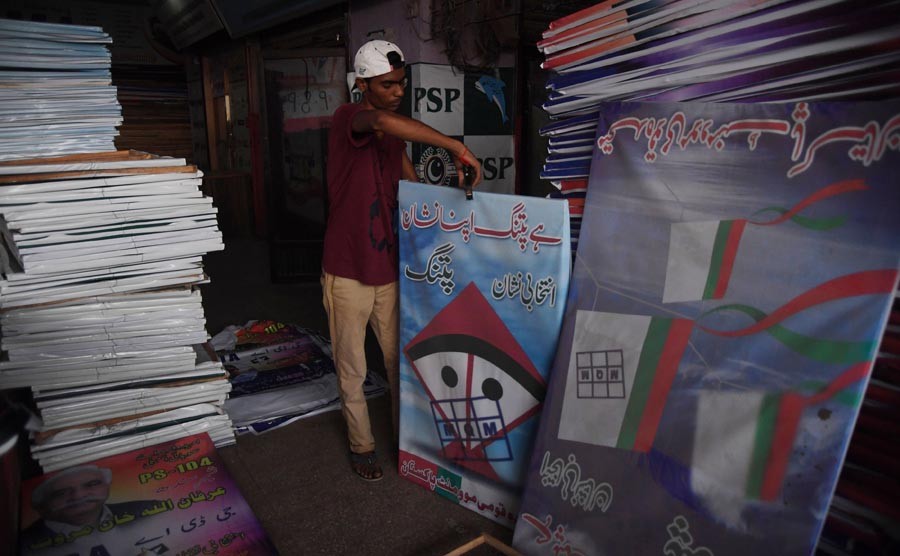
Taking advantage of the infighting within the MQM, the PPP, PTI and PML-N have fielded their heavy weights in Karachi

With the general elections just 17 days away, the political temperature in Karachi has risen a few notches, as major political parties gear up for a political battle on July 25 for 21 National Assembly and 44 Sindh Assembly seats in the city.
The city is a sort of new territory after the current delimitation of constituencies carried out in the light of provisional results of last year’s census and after the law enforcement operation that started in September 2013. Doubtlessly, these developments have affected the Muttahida Qaumi Movement-Pakistan (MQM-P) that has won most of the seats since its inception in 1984. Now other major rival political parties, especially the Pakistan People’s Party (PPP) and Pakistan Tehreek-e-Insaf (PTI) are trying to take advantage of the crisis within the MQM and are vying for seats earlier held by it.
For the MQM-P, upcoming election is a do-or-die battle. Reeling from ongoing crackdown, formation of the Pak Sarzameen Party by its former leaders Mustafa Kamal and Anis Qaimkhani, disassociating itself from its founder Altaf Hussain and splitting between Bahadurabad and PIB Colony factions recently, it is a greater challenge for the MQM-P.
It seems the party through consultations with community leaders has developed a strategy for upcoming polls. "This election is the most challenging for us but through our grassroots organisational structure and public support, we will retain our traditional seats," Syed Aminul Haque, the MQM-P spokesperson tells TNS.
The MQM had won 17 out of 20 seats in Karachi in 2013. This time, mainly because of delimitation, the party is optimistic about winning 12 to 14 seats, mainly from mohajir populated constituencies in Korangi, Central and East districts. Except a few seats in these districts, such as NA-243 where the PTI chief Imran Khan is a key contender, the MQM-P is not facing any potential challenger in most of its traditional constituencies.
The PSP, which has gained ground in the city due to crisis in the MQM, is also eyeing the mohajir electorate though it is very early to say whether they will win the seats or only act as a spoiler in the polls.
To take maximum advantage of crisis in the MQM, two major political parties --Pakistan People’s Party and Pakistan Tehreek-e-Insaf -- are also focusing on Karachi, and have fielded their party chiefs Bilawal Bhutto Zardari and Imran Khan from the city’s two different National Assembly constituencies.
The PPP has become a major beneficiary of the current delimitation because of which new constituencies consisting of Sindhi and Baloch populated rural areas have emerged. The party has chosen a safer constituency of NA-246 (Lyari and Old City Area) and is focusing on Sindh-Baloch constituencies. It is optimistic about increasing its National Assembly seat from one in 2013 polls to at least four to five in the city. The party has fielded weaker candidates, including seven women against the MQM-P in mohajir districts, mainly to comply with five per cent quota of women candidates on general seats.
However, the PTI has chosen a comparatively difficult constituency NA-243 (contains Gulshan-e-Iqbal, Gulistan-e-Johar and upper-middle class neighbourhoods of Bahadurabad) for its chief Imran Khan. The PTI has a tough contest with the MQM-P here. "For Imran, it was easy to win from NA-247 (DHA and Clifton) and NA-250 (Pashtun-populated areas of SITE), but the party chose a difficult constituency," says Imran Ismail, a PTI leader. "Contesting polls from this constituency will help the electoral campaigns of party candidates in neighbouring constituencies and districts."
Political analysts believe that the party is in a position to win one or two seats, including NA-243. "The PTI has been focusing on very few constituencies, including NA-243, and in other constituencies, it has been facing challenges of fissures within the party’s ranks and poor organisational structure," says Wakil Ur Rehman, a journalist covering elections in the city.
The Pakistan Muslim League-Nawaz has also fielded its Central President Mian Shahbaz Sharif from NA-249 constituency of Baldia Town, a former MQM stronghold. The PML-N has managed to get support of Muttahida Majlis-e-Amal (MMA) and Awami National Party (ANP) and negotiations with the MQM-P are on. Here the PTI’s Faisal Vawda is the other contestant.
Riding the bandwagon, the recently revived MMA has joined hands with the Jamaat-e-Islami which is hopeful that the coalition will help the party regain its lost turf in the city. Analysts believe there are dim chances the JI will achieve a significant place in the city except in the Pashtun populated NA-250 from where the JI Karachi chief Hafiz Naeemur Rehman is contesting polls.
However, Labbaik Tehreek-e-Pakistan, electoral front of the Tehreek-e-Labbaik Ya Rasool Allah, a Barelvi group with extreme views, is also challenging the vote bank of the MQM-P, PPP and MMA. The proscribed Ahle Sunnat Wal Jamaat Chief Allama Aurangzeb Farooqi is optimistic about winning NA-238, from where he lost a provincial assembly seat in 2013 by-polls with a margin of 202 votes.
Testing the waters for the first time, the ANP Sindh President Shahi Syed is contesting polls from the city’s two Pashtun constituencies of NA-250 and NA-238.